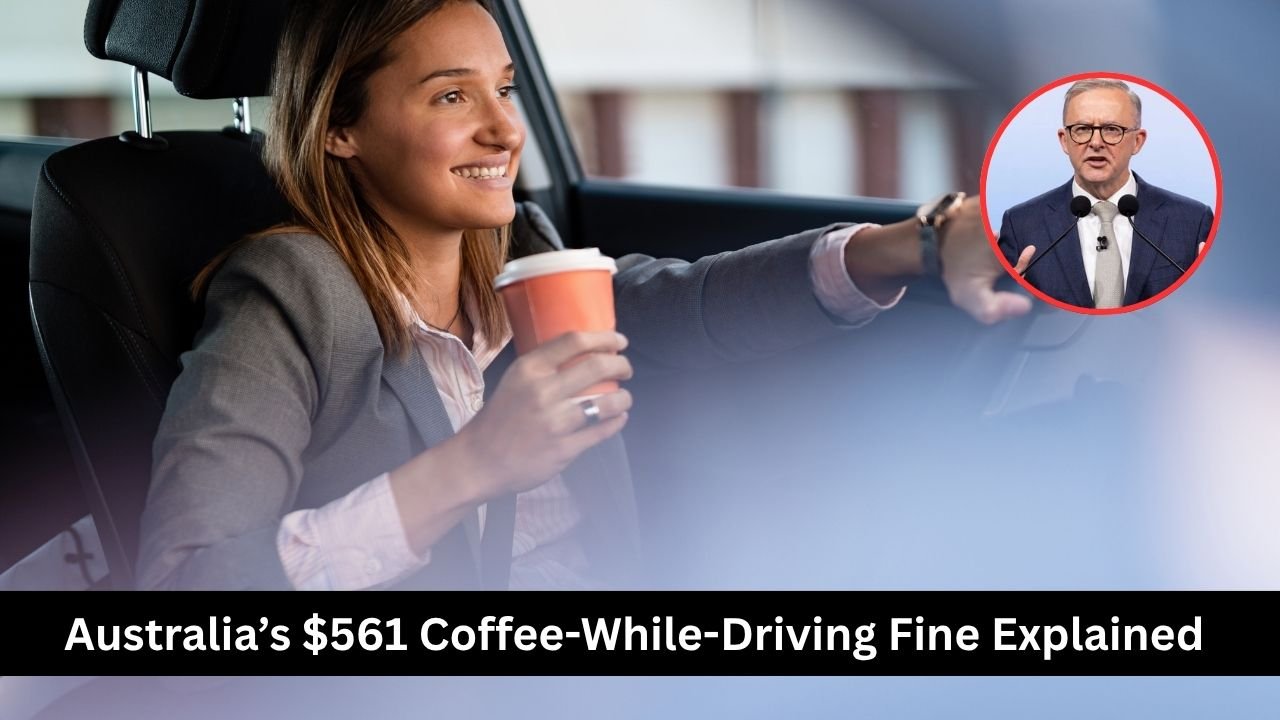A tougher crackdown on distracted driving now exposes motorists to fines up to $561 for eating or drinking behind the wheel, with enforcement expanding across multiple states and penalties escalating where attention lapses contribute to crashes or dangerous driving behavior .
What the rule targets
Authorities classify consuming beverages such as coffee, tea, or soft drinks while driving as a distraction that can impair reaction time and vehicle control, similar in principle to other behaviors that take hands, eyes, or attention off the road .
The rule covers both hot and cold drinks and can also capture related acts like unwrapping food, handling spills, or fumbling with lids if those actions reduce proper control of the vehicle .
Why the $561 penalty exists
Road safety agencies attribute a significant share of serious incidents to distraction, noting that even brief glances away from the road or one-handed driving increases risk, particularly at higher speeds or in dense traffic .
The new penalty aims to shift habits by encouraging drivers to pull over, use rest stops, or finish drinks before setting off, especially on long trips where fatigue and complacency elevate danger .
Where it applies
Queensland and New South Wales sit at the stricter end of the scale, while Victoria and other jurisdictions enforce related inattentive or failing-to-control offences that can be triggered by eating or drinking at the wheel .
Enforcement is statewide and includes urban, suburban, and regional roads, with police discretion applied to the specific driving behavior and risk created in the moment .
Penalties by state
- Queensland: $561 fine and 3 demerit points for eating or drinking while driving, with strong emphasis on sustained attention and full control of the vehicle .
- New South Wales: $481 for distracted driving conduct, commonly issued where drivers take eyes off the road or compromise control for non-driving tasks .
- Victoria: Up to $500 for inattentive driving or similar offences, with 2 demerit points, applied where behavior indicates insufficient control or divided attention .
- South Australia: Around $400 and 2 demerit points for driver distraction, aligned to state campaigns encouraging drivers to stay alert and avoid multitasking .
- Western Australia: About $300 and 2 demerit points for failing to maintain proper control, applicable where drinking or eating impairs steering or observation .
Cameras and patrol enforcement
Patrol vehicles, roadside operations, and in-car police cameras are used to identify drivers engaging in distracting behaviors, with visual confirmation of hands off the wheel or eyes off the forward roadway often central to alleged offences .
While mobile phone detection cameras are built for phone offences, authorities also leverage dashcam footage and officer-observed evidence to substantiate inattentive or failing-to-control charges tied to drinking or eating .
Legal grey areas
There is no blanket nationwide statute titled “drinking coffee while driving,” and enforcement typically relies on general offences like failing to have proper control, inattentive driving, or driver distraction, applied when behavior clearly undermines safe operation .
A sealed cup sitting in a holder is not inherently unlawful, but lifting, sipping, or dealing with spills can become an offence when it causes lane wander, erratic speed, or diverted attention observable to police or captured on footage .
When penalties escalate
Where distraction contributes to a crash, near miss, or dangerous maneuver, drivers can face higher fines, more demerit points, and potential court action, particularly if injuries occur or multiple risky behaviors are present .
Repeat offences compound consequences and can trigger license suspensions, especially if combined with other infringements like speeding or mobile phone use .
Practical compliance tips
- Finish drinks before driving or pull over safely in a legal parking area to sip, especially with hot beverages prone to spills that can trigger reflexive distractions .
- Keep both hands available for steering, and avoid opening lids, stirring, or adjusting thermoses while in motion; secure containers in a holder and only handle them when stationary and parked .
- Plan longer trips with scheduled breaks for hydration and snacks, reducing fatigue and the temptation to multitask while moving .
Young drivers and supervisors
Learners and novice drivers are at heightened risk from divided attention; supervisors should model distraction-free habits and discourage any food or drink handling while the vehicle is moving .
Graduated licensing programs emphasize hazard perception—maintaining full attention without secondary tasks markedly improves decision-making and reaction times .
Quick table of state settings
| State | Offence label | Fine (AUD) | Demerit | Notes |
|---|---|---|---|---|
| Queensland | Eating/drinking while driving | $561 | 3 | Strong enforcement and attention standards |
| New South Wales | Distracted driving | $481 | 3 | Officer observation and surveillance checks |
| Victoria | Inattentive driving | Up to $500 | 2 | Includes eating, drinking, grooming acts |
| South Australia | Driver distraction | $400 | 2 | Part of “Stay Alert” safety initiative |
| Western Australia | Failing to control | $300 | 2 | Applied if action undermines control |
Bottom line
Sipping coffee while driving can now attract fines up to $561 and demerit points where the act reduces attention or control, with broad enforcement across QLD, NSW, VIC, SA, and WA under their respective distraction and control laws .
Avoid handling drinks in motion, plan breaks, and keep hands and eyes committed to the task of driving to stay clear of penalties and, more importantly, reduce crash risk for all road users .
